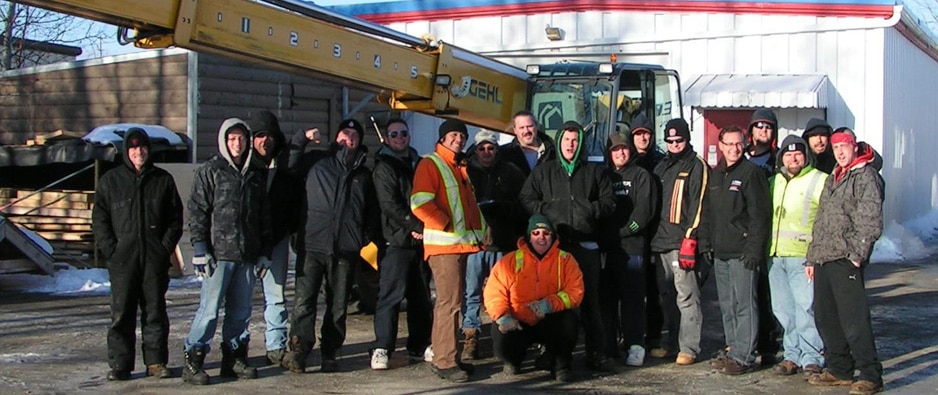

As I reflect upon the end of 2021, I would be remiss to not mention how appreciative I am of each SMART member’s dedication and perseverance during a continued uphill battle with COVID-19. Over the last 22 months of this pandemic, our members have stood on the frontlines, building hospitals, infrastructure and transportation projects. We have seen job site conditions improve with more inspections, and we must not go backwards. As I write this article, the Omicron variant is spreading faster than the previous strains. We must remain vigilant, continue to social distance, wear our masks and, when eligible, sign up and receive our booster shots
I am encouraged by the progress Canada is making to improve working conditions for all Canadians. Some of the potential changes that have been implemented or may be introduced in the future are as follows:
Worker Mobility Tax Credit
Skilled trades workers have always had to travel for work — that’s why we’re called journeypeople. But sometimes mobility creates a barrier for workers to go to where the work is. We need government support to address the longstanding issue of financial barriers to labour mobility through the implementation of a tax deduction for skilled trades workers for travel-related expenses when not covered by their employer.
Today, salespeople, professionals and Canadians in other industries can receive a tax deduction for the cost of their travel, meals and accommodations when traveling for work. The same option is denied to skilled trades workers who work on job sites that are in different regions or provinces from their primary residence.
The Income Tax Act, in its current form, is an inequitable tax policy. Today, salespeople, professionals and Canadians in other industries can receive a tax deduction for the cost of their travel, meals and accommodations when traveling for work. The same option is denied to skilled trades workers who work on job sites that are in different regions or provinces from their primary residence. For example, someone selling rebar or conduit for the construction of a new building can travel and deduct from income the cost of their travel, meals and accommodations, while the same option is unjustly denied to skilled workers who work hard to construct the buildings. Skilled trades workers should not be punished financially due to their choice of occupation. The government of Canada has a responsibility to ensure a system of tax fairness is in place for all Canadians.
While some project budgets allow for workers’ travel costs to be paid for, many do not. Instead, they require workers to pay out of pocket, often costing them thousands of dollars. With families to support, temporary relocation costs can prove too burdensome for workers, contributing to increased reliance on programs like Employment Insurance (EI) and exacerbating labour shortages in certain regions.
Depending on private and public investments, at different times certain regions will have more employment opportunities than others. These conditions lead to a necessity for skilled trades workers to temporarily relocate or travel long distances for projects to meet the needs of the market. As projects are completed, workers will then return to their permanent residence. For example, as work winds down on several major projects in Newfoundland and Labrador, such as the Muskrat Falls project, workers in Canada’s Building Trades Unions (CBTU) will have to travel outside of the province for work. While these workers will help meet labour shortages in regions such as Ontario and British Columbia, it means that they will likely incur out-ofpocket expenses as they temporarily relocate for work. These costs can add up and pose a burden for workers who are trying to support their family back home.
With the COVID-19 pandemic, the government of Canada is supporting more Canadians than ever before through EI and programs like the Canada Recovery Benefit. If implemented, a skilled workforce mobility tax deduction would result in savings for both the government and for skilled trades workers. By allowing skilled trades workers to deduct travel costs associated with work from their income, they won’t need to utilize programs like EI, and they will contribute to the Canadian economy through tax revenue from their employment.
As 2022 gets underway, the CBTU continue to strongly advocate for the inclusion of a skilled trades workforce mobility tax deduction in the 2022 budget. We’re proud of the work done on this issue including — a CBTU first — being included in mandate letters from both Deputy Prime Minister and Minister of Finance Chrystia Freeland and Minister of Labour Seamus O’Regan. While we celebrate this victory, the battle is not yet won. We need to work together to ensure this is contained in Budget 2022. Visit https://buildingtrades.ca/advocacy/labour-mobility for more information, to send a letter and to stay tuned for updates.

National Child Care Program
In Budget 2021, the Canadian government unveiled its Early Learning and Child Care Plan, committing $30 billion over the next five years and $8.3 billion ongoing. The government is committed to working with provinces and territories to build a Canada-wide, community-based system of quality child care. This news was welcomed by CBTU, as child care has been a long-standing issue for families employed in the construction sector across Canada. To ensure the development of an accessible child care program that supports Canada’s skilled trades workforce, CBTU conducted focus groups in fall 2021 with parents who work in the unionized construction sector and their spouses. The focus groups were aimed at gathering information on their experiences and realities of working in the construction industry and managing child care.
In developing child care programs, Canada’s Building Trades Unions are calling for provincial governments to incorporate the following recommendations to ensure equitable access to child care for all families, including those who work outside normal work hours. Tradespeople and their families need:
- Early and late hours of care— To accommodate the nature of construction jobs that often consist of early start times and late pickups, we require earlier drop-off and later pickup hours given our workers usually do not work the standard 9–5 schedule of parents in other industries.
- Shorter waitlists — Like workers in other industries, skilled trades people have struggled with being on long waitlists for child care. Parents need to be able to enroll their children promptly, especially when unexpected job opportunities arise or when workers are required to travel to a new location for work. It is undeniable that additional child care spaces are needed.
- Flexible child care options — Many child care centers require enrollment commitments over long periods, forcing families to pay for a child care spot whether they are there or not. In the construction industry, work is cyclical and can be weather-dependent, shifts vary from job site to job site, shifts are often long and there can be periods when no work is available locally. It is often not feasible for skilled trades workers to sign a long-term commitment for a child care spot. Having the flexibility to make choices that are best suited to each individual family’s needs and requirements was deemed very important to members who participated in the focus groups.
- Quality drop-in child care arrangements — Quality of child care — whether short- or long-term — is of utmost importance to families. Parents need to feel comfortable where they leave their children.
- Raise the age limit — The age limit for the child care program needs to be raised. Many of the agreements with the provinces specify that they plan to provide children under five or six years old with $10-per-day child care, but parents also require child care for children under 12 (or the age that corresponds with provincial guidelines for children staying home alone) before and after school to accommodate their work schedules and the nature of shift work in the construction industry.
We have been building momentum as we strive for a better Canada and a brighter future. Please continue to stay active, get involved and stay safe!
In solidarity
I remain, fraternally yours,

Chris Paswisty
Director of Canadian Affairs
Related News
- Canada Day 2025: General President Coleman’s message to members
- SMART Canada statement on National Roofing Week
- Special Focus: SMART launches childcare benefit
- United across our two nations
- What we pay for
- Advancing safety and strengthening unity
- Taking the initiative across Canada
- REEF Act passed in win for rail workers
- SMART members fight for a just future at Martin Luther King Conference
- Ontario organizers hold training to grow our union